Challenges Faced by Nurses & the IoM's Future of Nursing Initiative
VerifiedAdded on 2023/04/23
|8
|2160
|396
Essay
AI Summary
This essay explores the challenges confronting nurses today, including nursing shortages, long working hours, and workplace hazards, and critically evaluates the Institute of Medicine’s 2010 Future of Nursing report, emphasizing the importance of higher education and training for nurses. It highlights five core competencies—patient-centered care, teamwork, evidence-based practice, quality improvement, and information technology—that nurses must develop to overcome these challenges and promote skill development in nursing practice. The essay addresses barriers to achieving these competencies and suggests strategies for improvement, such as leadership support, inter-professional collaboration training, and user-friendly technology, ultimately advocating for an upgrade in nursing skills to meet complex care demands.
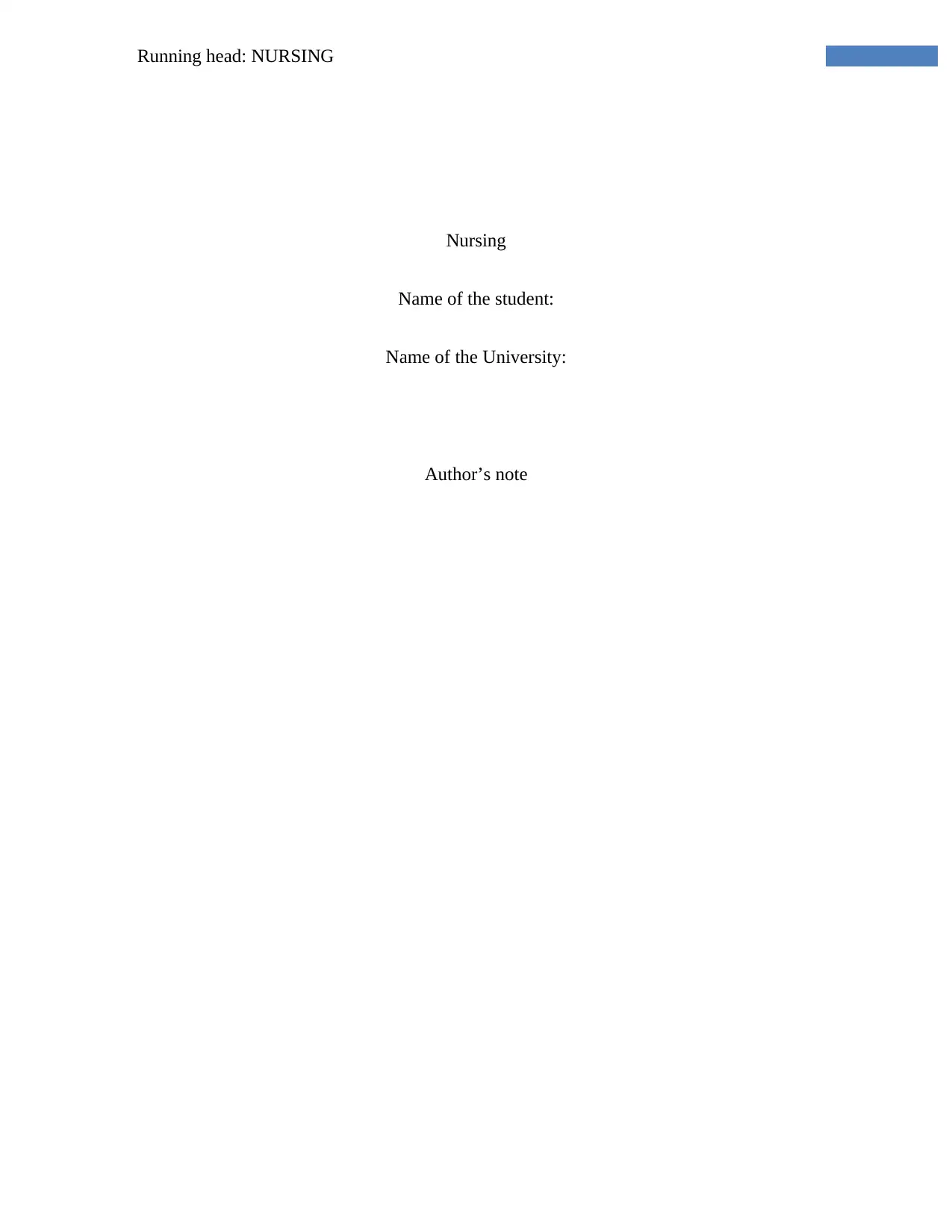
Running head: NURSING
Nursing
Name of the student:
Name of the University:
Author’s note
Nursing
Name of the student:
Name of the University:
Author’s note
Paraphrase This Document
Need a fresh take? Get an instant paraphrase of this document with our AI Paraphraser
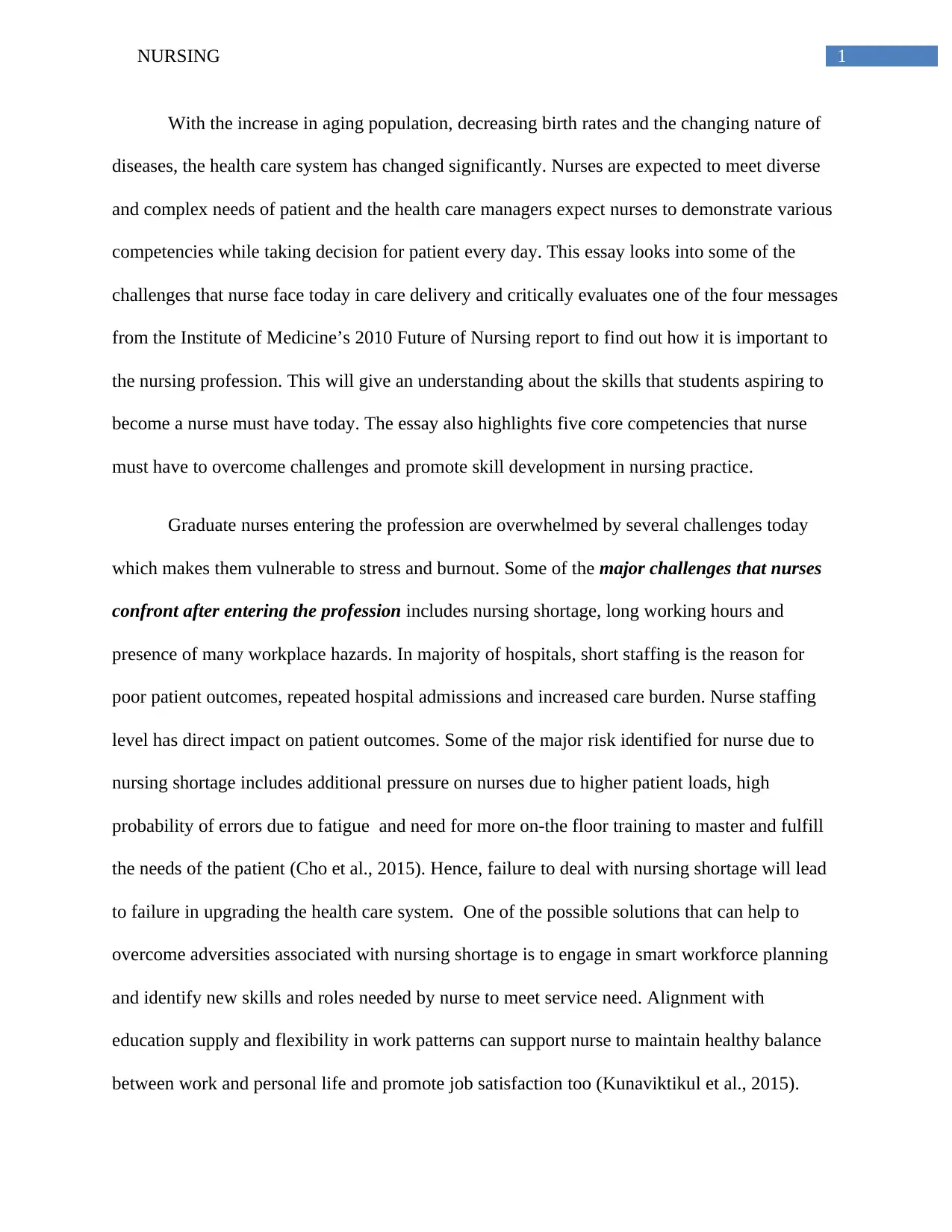
1NURSING
With the increase in aging population, decreasing birth rates and the changing nature of
diseases, the health care system has changed significantly. Nurses are expected to meet diverse
and complex needs of patient and the health care managers expect nurses to demonstrate various
competencies while taking decision for patient every day. This essay looks into some of the
challenges that nurse face today in care delivery and critically evaluates one of the four messages
from the Institute of Medicine’s 2010 Future of Nursing report to find out how it is important to
the nursing profession. This will give an understanding about the skills that students aspiring to
become a nurse must have today. The essay also highlights five core competencies that nurse
must have to overcome challenges and promote skill development in nursing practice.
Graduate nurses entering the profession are overwhelmed by several challenges today
which makes them vulnerable to stress and burnout. Some of the major challenges that nurses
confront after entering the profession includes nursing shortage, long working hours and
presence of many workplace hazards. In majority of hospitals, short staffing is the reason for
poor patient outcomes, repeated hospital admissions and increased care burden. Nurse staffing
level has direct impact on patient outcomes. Some of the major risk identified for nurse due to
nursing shortage includes additional pressure on nurses due to higher patient loads, high
probability of errors due to fatigue and need for more on-the floor training to master and fulfill
the needs of the patient (Cho et al., 2015). Hence, failure to deal with nursing shortage will lead
to failure in upgrading the health care system. One of the possible solutions that can help to
overcome adversities associated with nursing shortage is to engage in smart workforce planning
and identify new skills and roles needed by nurse to meet service need. Alignment with
education supply and flexibility in work patterns can support nurse to maintain healthy balance
between work and personal life and promote job satisfaction too (Kunaviktikul et al., 2015).
With the increase in aging population, decreasing birth rates and the changing nature of
diseases, the health care system has changed significantly. Nurses are expected to meet diverse
and complex needs of patient and the health care managers expect nurses to demonstrate various
competencies while taking decision for patient every day. This essay looks into some of the
challenges that nurse face today in care delivery and critically evaluates one of the four messages
from the Institute of Medicine’s 2010 Future of Nursing report to find out how it is important to
the nursing profession. This will give an understanding about the skills that students aspiring to
become a nurse must have today. The essay also highlights five core competencies that nurse
must have to overcome challenges and promote skill development in nursing practice.
Graduate nurses entering the profession are overwhelmed by several challenges today
which makes them vulnerable to stress and burnout. Some of the major challenges that nurses
confront after entering the profession includes nursing shortage, long working hours and
presence of many workplace hazards. In majority of hospitals, short staffing is the reason for
poor patient outcomes, repeated hospital admissions and increased care burden. Nurse staffing
level has direct impact on patient outcomes. Some of the major risk identified for nurse due to
nursing shortage includes additional pressure on nurses due to higher patient loads, high
probability of errors due to fatigue and need for more on-the floor training to master and fulfill
the needs of the patient (Cho et al., 2015). Hence, failure to deal with nursing shortage will lead
to failure in upgrading the health care system. One of the possible solutions that can help to
overcome adversities associated with nursing shortage is to engage in smart workforce planning
and identify new skills and roles needed by nurse to meet service need. Alignment with
education supply and flexibility in work patterns can support nurse to maintain healthy balance
between work and personal life and promote job satisfaction too (Kunaviktikul et al., 2015).
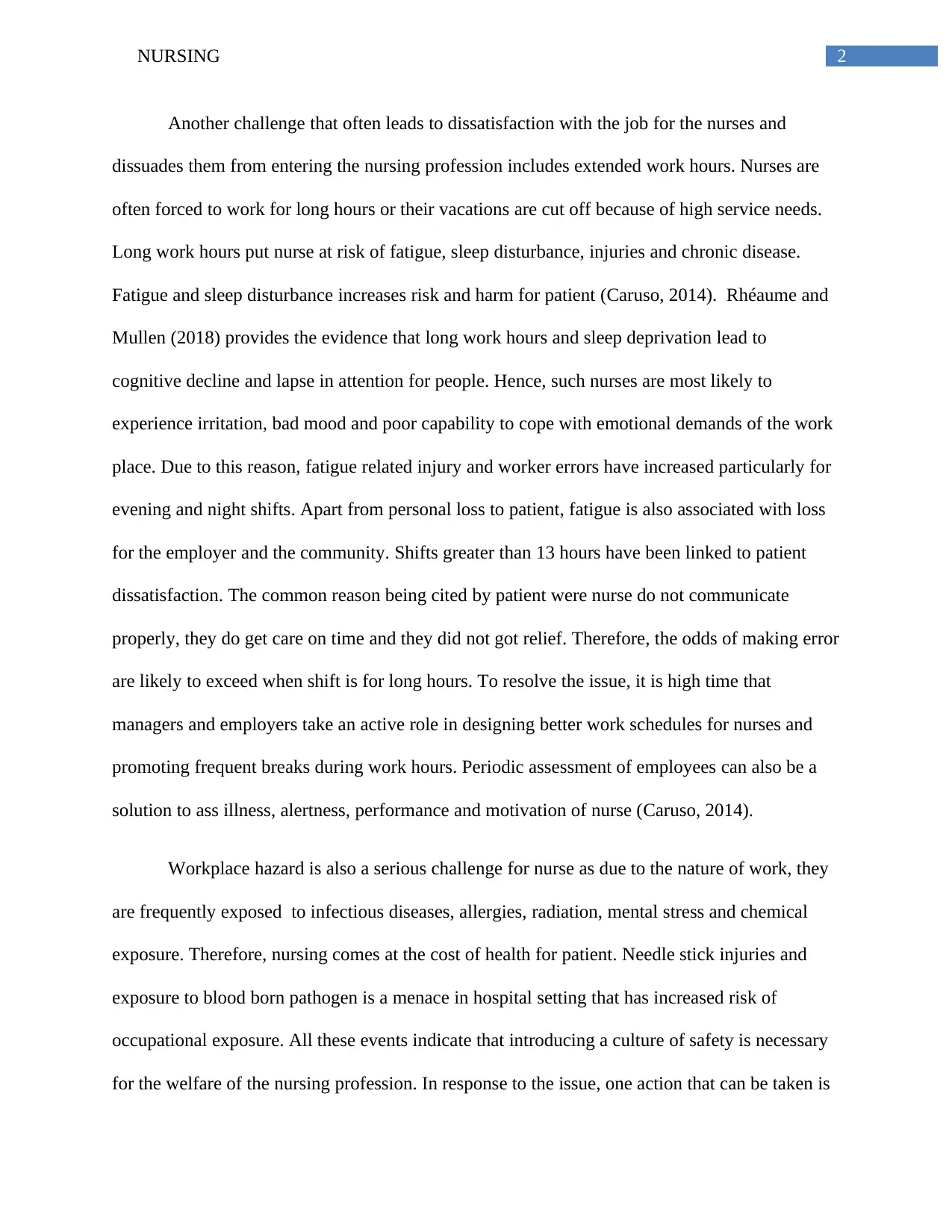
2NURSING
Another challenge that often leads to dissatisfaction with the job for the nurses and
dissuades them from entering the nursing profession includes extended work hours. Nurses are
often forced to work for long hours or their vacations are cut off because of high service needs.
Long work hours put nurse at risk of fatigue, sleep disturbance, injuries and chronic disease.
Fatigue and sleep disturbance increases risk and harm for patient (Caruso, 2014). Rhéaume and
Mullen (2018) provides the evidence that long work hours and sleep deprivation lead to
cognitive decline and lapse in attention for people. Hence, such nurses are most likely to
experience irritation, bad mood and poor capability to cope with emotional demands of the work
place. Due to this reason, fatigue related injury and worker errors have increased particularly for
evening and night shifts. Apart from personal loss to patient, fatigue is also associated with loss
for the employer and the community. Shifts greater than 13 hours have been linked to patient
dissatisfaction. The common reason being cited by patient were nurse do not communicate
properly, they do get care on time and they did not got relief. Therefore, the odds of making error
are likely to exceed when shift is for long hours. To resolve the issue, it is high time that
managers and employers take an active role in designing better work schedules for nurses and
promoting frequent breaks during work hours. Periodic assessment of employees can also be a
solution to ass illness, alertness, performance and motivation of nurse (Caruso, 2014).
Workplace hazard is also a serious challenge for nurse as due to the nature of work, they
are frequently exposed to infectious diseases, allergies, radiation, mental stress and chemical
exposure. Therefore, nursing comes at the cost of health for patient. Needle stick injuries and
exposure to blood born pathogen is a menace in hospital setting that has increased risk of
occupational exposure. All these events indicate that introducing a culture of safety is necessary
for the welfare of the nursing profession. In response to the issue, one action that can be taken is
Another challenge that often leads to dissatisfaction with the job for the nurses and
dissuades them from entering the nursing profession includes extended work hours. Nurses are
often forced to work for long hours or their vacations are cut off because of high service needs.
Long work hours put nurse at risk of fatigue, sleep disturbance, injuries and chronic disease.
Fatigue and sleep disturbance increases risk and harm for patient (Caruso, 2014). Rhéaume and
Mullen (2018) provides the evidence that long work hours and sleep deprivation lead to
cognitive decline and lapse in attention for people. Hence, such nurses are most likely to
experience irritation, bad mood and poor capability to cope with emotional demands of the work
place. Due to this reason, fatigue related injury and worker errors have increased particularly for
evening and night shifts. Apart from personal loss to patient, fatigue is also associated with loss
for the employer and the community. Shifts greater than 13 hours have been linked to patient
dissatisfaction. The common reason being cited by patient were nurse do not communicate
properly, they do get care on time and they did not got relief. Therefore, the odds of making error
are likely to exceed when shift is for long hours. To resolve the issue, it is high time that
managers and employers take an active role in designing better work schedules for nurses and
promoting frequent breaks during work hours. Periodic assessment of employees can also be a
solution to ass illness, alertness, performance and motivation of nurse (Caruso, 2014).
Workplace hazard is also a serious challenge for nurse as due to the nature of work, they
are frequently exposed to infectious diseases, allergies, radiation, mental stress and chemical
exposure. Therefore, nursing comes at the cost of health for patient. Needle stick injuries and
exposure to blood born pathogen is a menace in hospital setting that has increased risk of
occupational exposure. All these events indicate that introducing a culture of safety is necessary
for the welfare of the nursing profession. In response to the issue, one action that can be taken is
⊘ This is a preview!⊘
Do you want full access?
Subscribe today to unlock all pages.

Trusted by 1+ million students worldwide
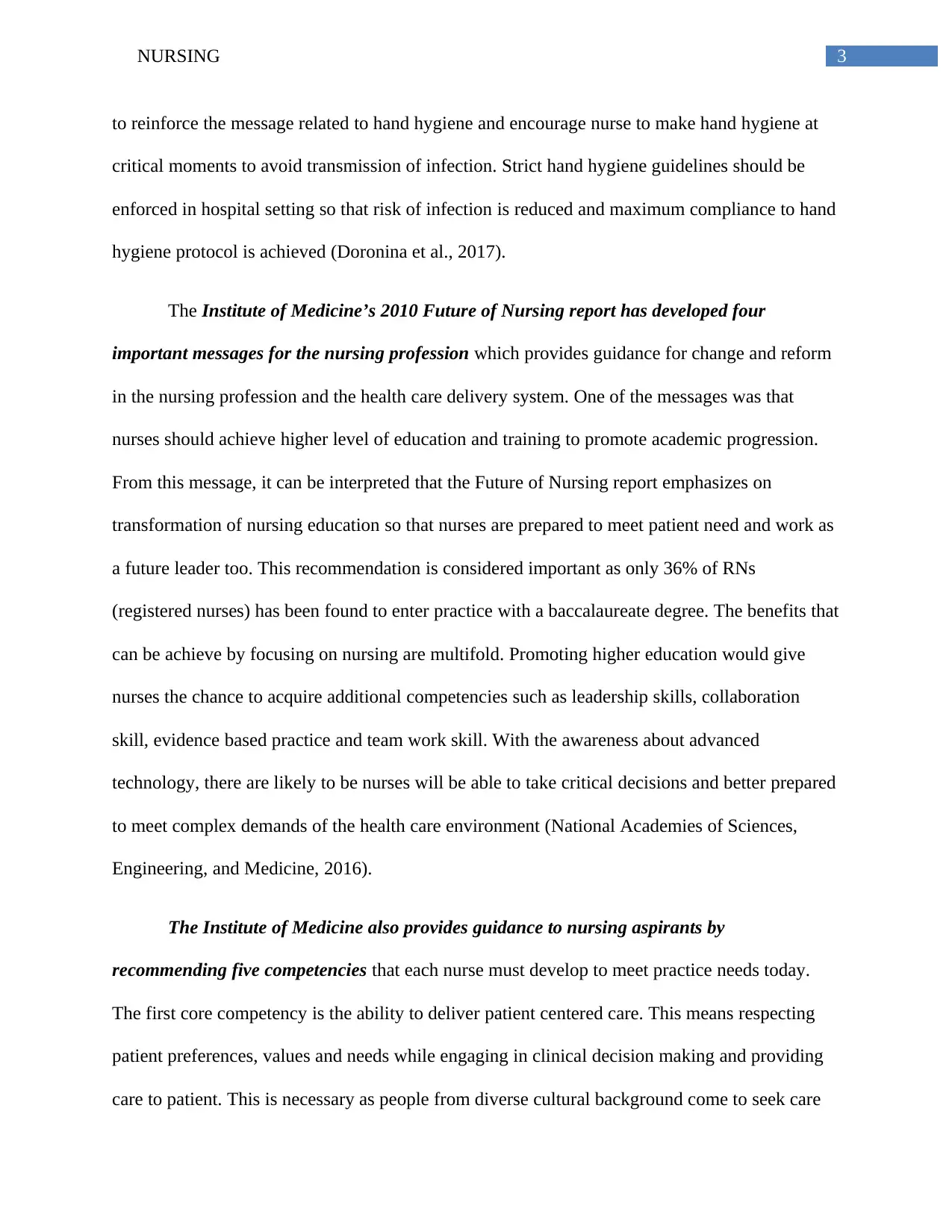
3NURSING
to reinforce the message related to hand hygiene and encourage nurse to make hand hygiene at
critical moments to avoid transmission of infection. Strict hand hygiene guidelines should be
enforced in hospital setting so that risk of infection is reduced and maximum compliance to hand
hygiene protocol is achieved (Doronina et al., 2017).
The Institute of Medicine’s 2010 Future of Nursing report has developed four
important messages for the nursing profession which provides guidance for change and reform
in the nursing profession and the health care delivery system. One of the messages was that
nurses should achieve higher level of education and training to promote academic progression.
From this message, it can be interpreted that the Future of Nursing report emphasizes on
transformation of nursing education so that nurses are prepared to meet patient need and work as
a future leader too. This recommendation is considered important as only 36% of RNs
(registered nurses) has been found to enter practice with a baccalaureate degree. The benefits that
can be achieve by focusing on nursing are multifold. Promoting higher education would give
nurses the chance to acquire additional competencies such as leadership skills, collaboration
skill, evidence based practice and team work skill. With the awareness about advanced
technology, there are likely to be nurses will be able to take critical decisions and better prepared
to meet complex demands of the health care environment (National Academies of Sciences,
Engineering, and Medicine, 2016).
The Institute of Medicine also provides guidance to nursing aspirants by
recommending five competencies that each nurse must develop to meet practice needs today.
The first core competency is the ability to deliver patient centered care. This means respecting
patient preferences, values and needs while engaging in clinical decision making and providing
care to patient. This is necessary as people from diverse cultural background come to seek care
to reinforce the message related to hand hygiene and encourage nurse to make hand hygiene at
critical moments to avoid transmission of infection. Strict hand hygiene guidelines should be
enforced in hospital setting so that risk of infection is reduced and maximum compliance to hand
hygiene protocol is achieved (Doronina et al., 2017).
The Institute of Medicine’s 2010 Future of Nursing report has developed four
important messages for the nursing profession which provides guidance for change and reform
in the nursing profession and the health care delivery system. One of the messages was that
nurses should achieve higher level of education and training to promote academic progression.
From this message, it can be interpreted that the Future of Nursing report emphasizes on
transformation of nursing education so that nurses are prepared to meet patient need and work as
a future leader too. This recommendation is considered important as only 36% of RNs
(registered nurses) has been found to enter practice with a baccalaureate degree. The benefits that
can be achieve by focusing on nursing are multifold. Promoting higher education would give
nurses the chance to acquire additional competencies such as leadership skills, collaboration
skill, evidence based practice and team work skill. With the awareness about advanced
technology, there are likely to be nurses will be able to take critical decisions and better prepared
to meet complex demands of the health care environment (National Academies of Sciences,
Engineering, and Medicine, 2016).
The Institute of Medicine also provides guidance to nursing aspirants by
recommending five competencies that each nurse must develop to meet practice needs today.
The first core competency is the ability to deliver patient centered care. This means respecting
patient preferences, values and needs while engaging in clinical decision making and providing
care to patient. This is necessary as people from diverse cultural background come to seek care
Paraphrase This Document
Need a fresh take? Get an instant paraphrase of this document with our AI Paraphraser
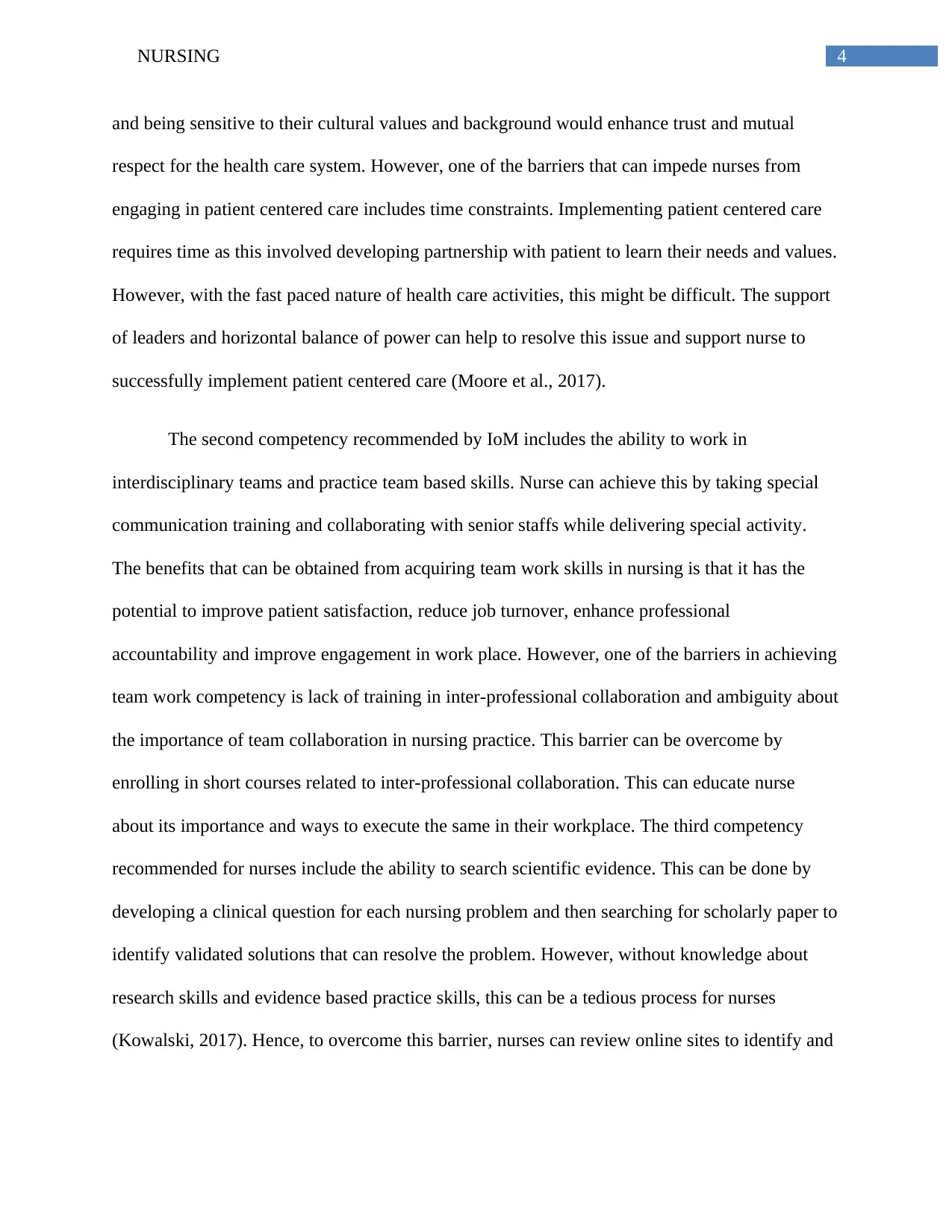
4NURSING
and being sensitive to their cultural values and background would enhance trust and mutual
respect for the health care system. However, one of the barriers that can impede nurses from
engaging in patient centered care includes time constraints. Implementing patient centered care
requires time as this involved developing partnership with patient to learn their needs and values.
However, with the fast paced nature of health care activities, this might be difficult. The support
of leaders and horizontal balance of power can help to resolve this issue and support nurse to
successfully implement patient centered care (Moore et al., 2017).
The second competency recommended by IoM includes the ability to work in
interdisciplinary teams and practice team based skills. Nurse can achieve this by taking special
communication training and collaborating with senior staffs while delivering special activity.
The benefits that can be obtained from acquiring team work skills in nursing is that it has the
potential to improve patient satisfaction, reduce job turnover, enhance professional
accountability and improve engagement in work place. However, one of the barriers in achieving
team work competency is lack of training in inter-professional collaboration and ambiguity about
the importance of team collaboration in nursing practice. This barrier can be overcome by
enrolling in short courses related to inter-professional collaboration. This can educate nurse
about its importance and ways to execute the same in their workplace. The third competency
recommended for nurses include the ability to search scientific evidence. This can be done by
developing a clinical question for each nursing problem and then searching for scholarly paper to
identify validated solutions that can resolve the problem. However, without knowledge about
research skills and evidence based practice skills, this can be a tedious process for nurses
(Kowalski, 2017). Hence, to overcome this barrier, nurses can review online sites to identify and
and being sensitive to their cultural values and background would enhance trust and mutual
respect for the health care system. However, one of the barriers that can impede nurses from
engaging in patient centered care includes time constraints. Implementing patient centered care
requires time as this involved developing partnership with patient to learn their needs and values.
However, with the fast paced nature of health care activities, this might be difficult. The support
of leaders and horizontal balance of power can help to resolve this issue and support nurse to
successfully implement patient centered care (Moore et al., 2017).
The second competency recommended by IoM includes the ability to work in
interdisciplinary teams and practice team based skills. Nurse can achieve this by taking special
communication training and collaborating with senior staffs while delivering special activity.
The benefits that can be obtained from acquiring team work skills in nursing is that it has the
potential to improve patient satisfaction, reduce job turnover, enhance professional
accountability and improve engagement in work place. However, one of the barriers in achieving
team work competency is lack of training in inter-professional collaboration and ambiguity about
the importance of team collaboration in nursing practice. This barrier can be overcome by
enrolling in short courses related to inter-professional collaboration. This can educate nurse
about its importance and ways to execute the same in their workplace. The third competency
recommended for nurses include the ability to search scientific evidence. This can be done by
developing a clinical question for each nursing problem and then searching for scholarly paper to
identify validated solutions that can resolve the problem. However, without knowledge about
research skills and evidence based practice skills, this can be a tedious process for nurses
(Kowalski, 2017). Hence, to overcome this barrier, nurses can review online sites to identify and
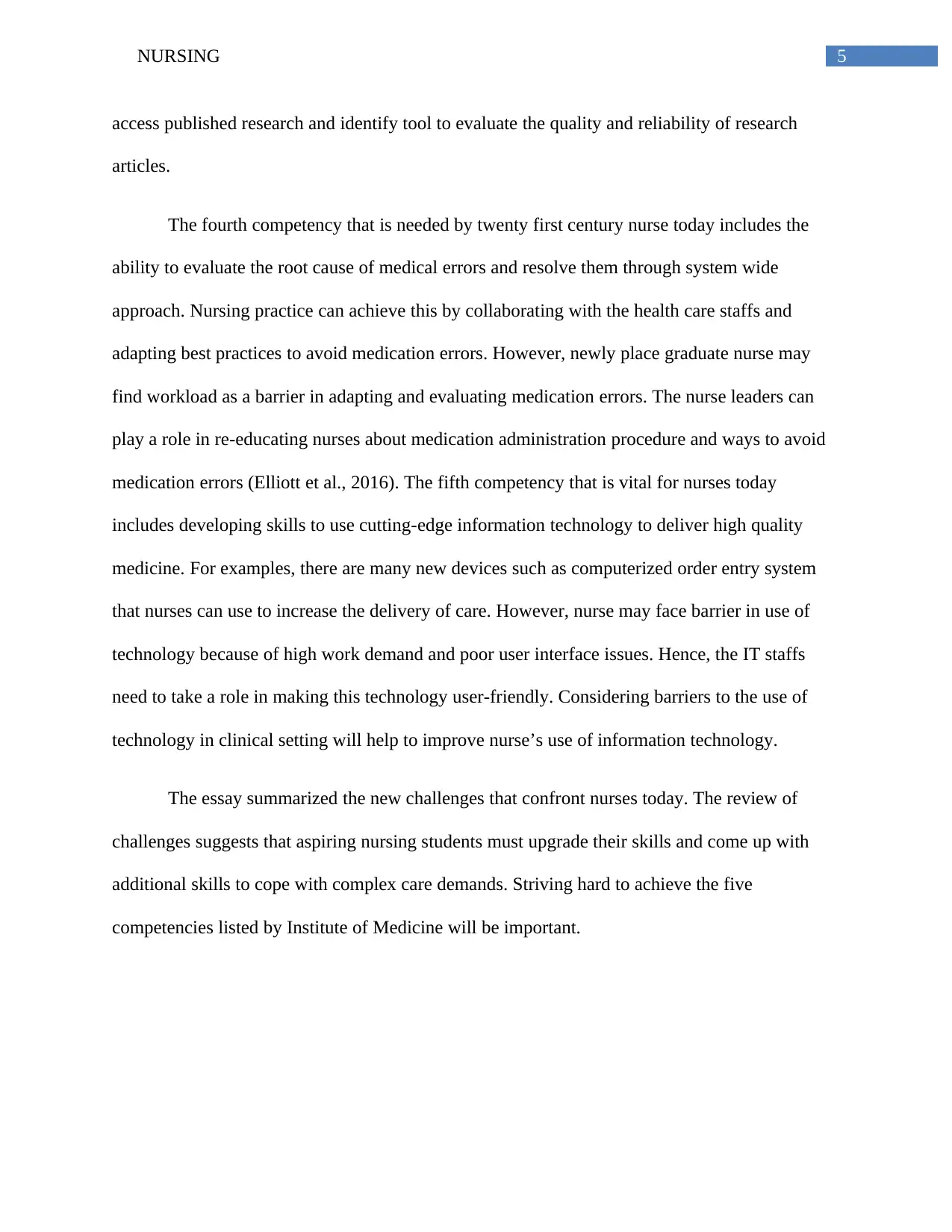
5NURSING
access published research and identify tool to evaluate the quality and reliability of research
articles.
The fourth competency that is needed by twenty first century nurse today includes the
ability to evaluate the root cause of medical errors and resolve them through system wide
approach. Nursing practice can achieve this by collaborating with the health care staffs and
adapting best practices to avoid medication errors. However, newly place graduate nurse may
find workload as a barrier in adapting and evaluating medication errors. The nurse leaders can
play a role in re-educating nurses about medication administration procedure and ways to avoid
medication errors (Elliott et al., 2016). The fifth competency that is vital for nurses today
includes developing skills to use cutting-edge information technology to deliver high quality
medicine. For examples, there are many new devices such as computerized order entry system
that nurses can use to increase the delivery of care. However, nurse may face barrier in use of
technology because of high work demand and poor user interface issues. Hence, the IT staffs
need to take a role in making this technology user-friendly. Considering barriers to the use of
technology in clinical setting will help to improve nurse’s use of information technology.
The essay summarized the new challenges that confront nurses today. The review of
challenges suggests that aspiring nursing students must upgrade their skills and come up with
additional skills to cope with complex care demands. Striving hard to achieve the five
competencies listed by Institute of Medicine will be important.
access published research and identify tool to evaluate the quality and reliability of research
articles.
The fourth competency that is needed by twenty first century nurse today includes the
ability to evaluate the root cause of medical errors and resolve them through system wide
approach. Nursing practice can achieve this by collaborating with the health care staffs and
adapting best practices to avoid medication errors. However, newly place graduate nurse may
find workload as a barrier in adapting and evaluating medication errors. The nurse leaders can
play a role in re-educating nurses about medication administration procedure and ways to avoid
medication errors (Elliott et al., 2016). The fifth competency that is vital for nurses today
includes developing skills to use cutting-edge information technology to deliver high quality
medicine. For examples, there are many new devices such as computerized order entry system
that nurses can use to increase the delivery of care. However, nurse may face barrier in use of
technology because of high work demand and poor user interface issues. Hence, the IT staffs
need to take a role in making this technology user-friendly. Considering barriers to the use of
technology in clinical setting will help to improve nurse’s use of information technology.
The essay summarized the new challenges that confront nurses today. The review of
challenges suggests that aspiring nursing students must upgrade their skills and come up with
additional skills to cope with complex care demands. Striving hard to achieve the five
competencies listed by Institute of Medicine will be important.
⊘ This is a preview!⊘
Do you want full access?
Subscribe today to unlock all pages.

Trusted by 1+ million students worldwide
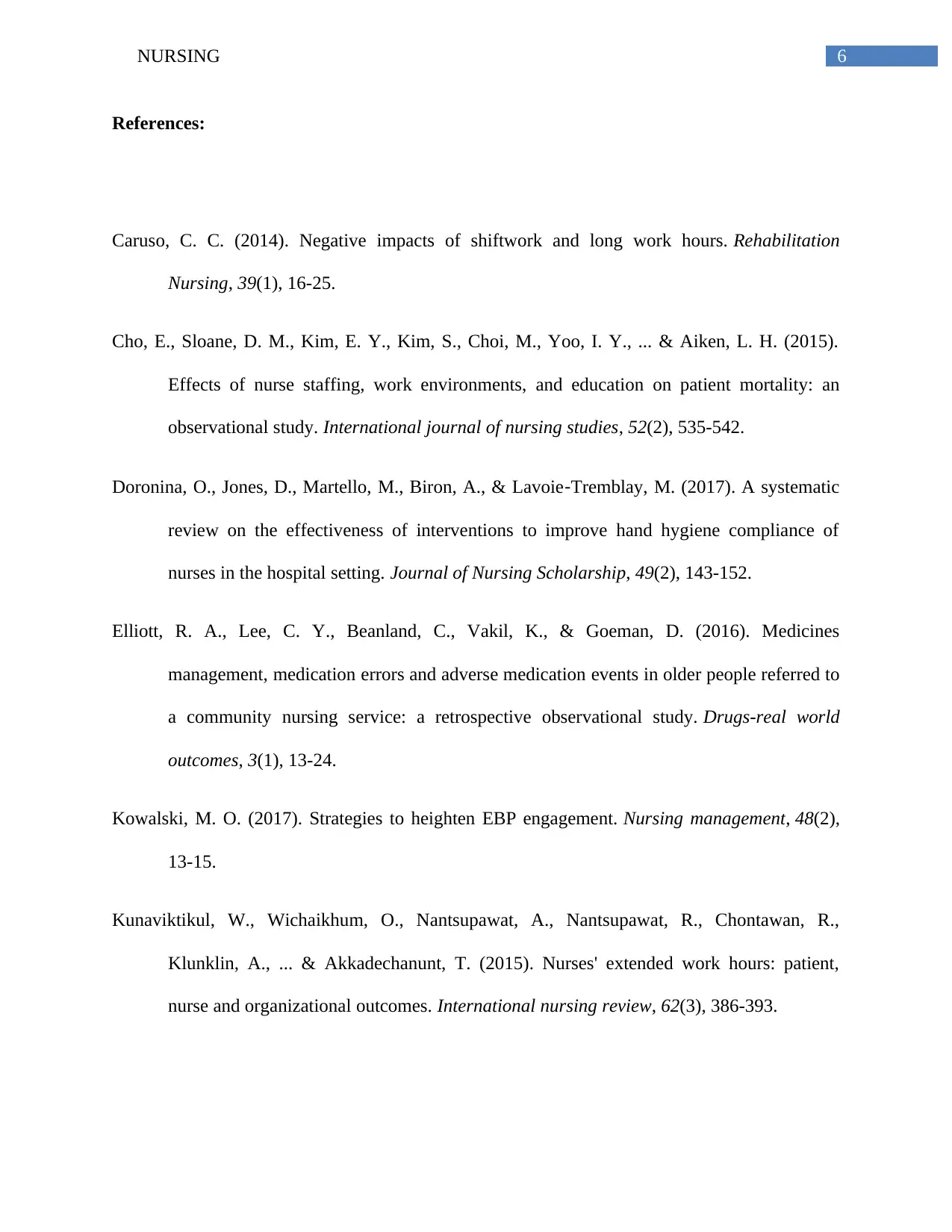
6NURSING
References:
Caruso, C. C. (2014). Negative impacts of shiftwork and long work hours. Rehabilitation
Nursing, 39(1), 16-25.
Cho, E., Sloane, D. M., Kim, E. Y., Kim, S., Choi, M., Yoo, I. Y., ... & Aiken, L. H. (2015).
Effects of nurse staffing, work environments, and education on patient mortality: an
observational study. International journal of nursing studies, 52(2), 535-542.
Doronina, O., Jones, D., Martello, M., Biron, A., & Lavoie‐Tremblay, M. (2017). A systematic
review on the effectiveness of interventions to improve hand hygiene compliance of
nurses in the hospital setting. Journal of Nursing Scholarship, 49(2), 143-152.
Elliott, R. A., Lee, C. Y., Beanland, C., Vakil, K., & Goeman, D. (2016). Medicines
management, medication errors and adverse medication events in older people referred to
a community nursing service: a retrospective observational study. Drugs-real world
outcomes, 3(1), 13-24.
Kowalski, M. O. (2017). Strategies to heighten EBP engagement. Nursing management, 48(2),
13-15.
Kunaviktikul, W., Wichaikhum, O., Nantsupawat, A., Nantsupawat, R., Chontawan, R.,
Klunklin, A., ... & Akkadechanunt, T. (2015). Nurses' extended work hours: patient,
nurse and organizational outcomes. International nursing review, 62(3), 386-393.
References:
Caruso, C. C. (2014). Negative impacts of shiftwork and long work hours. Rehabilitation
Nursing, 39(1), 16-25.
Cho, E., Sloane, D. M., Kim, E. Y., Kim, S., Choi, M., Yoo, I. Y., ... & Aiken, L. H. (2015).
Effects of nurse staffing, work environments, and education on patient mortality: an
observational study. International journal of nursing studies, 52(2), 535-542.
Doronina, O., Jones, D., Martello, M., Biron, A., & Lavoie‐Tremblay, M. (2017). A systematic
review on the effectiveness of interventions to improve hand hygiene compliance of
nurses in the hospital setting. Journal of Nursing Scholarship, 49(2), 143-152.
Elliott, R. A., Lee, C. Y., Beanland, C., Vakil, K., & Goeman, D. (2016). Medicines
management, medication errors and adverse medication events in older people referred to
a community nursing service: a retrospective observational study. Drugs-real world
outcomes, 3(1), 13-24.
Kowalski, M. O. (2017). Strategies to heighten EBP engagement. Nursing management, 48(2),
13-15.
Kunaviktikul, W., Wichaikhum, O., Nantsupawat, A., Nantsupawat, R., Chontawan, R.,
Klunklin, A., ... & Akkadechanunt, T. (2015). Nurses' extended work hours: patient,
nurse and organizational outcomes. International nursing review, 62(3), 386-393.
Paraphrase This Document
Need a fresh take? Get an instant paraphrase of this document with our AI Paraphraser
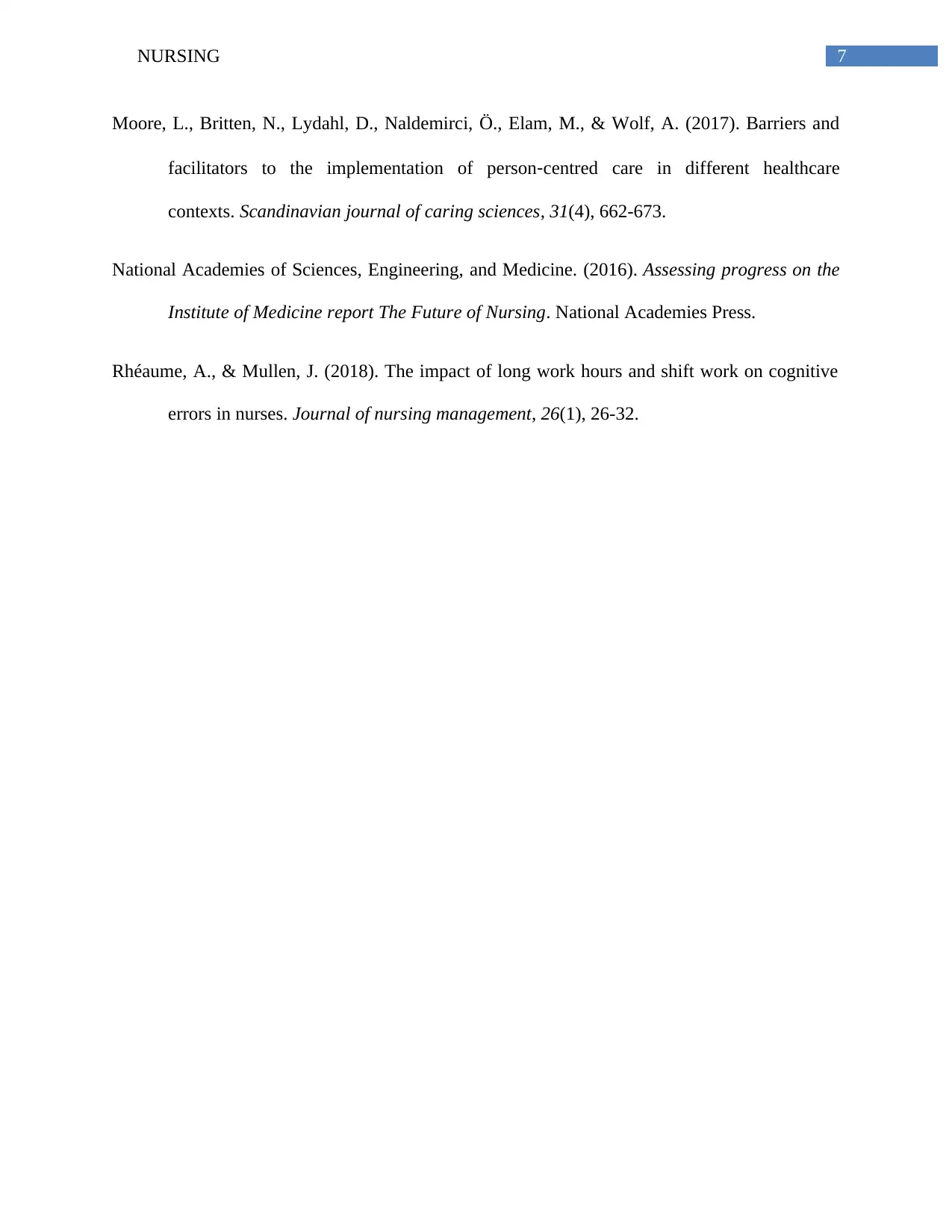
7NURSING
Moore, L., Britten, N., Lydahl, D., Naldemirci, Ö., Elam, M., & Wolf, A. (2017). Barriers and
facilitators to the implementation of person‐centred care in different healthcare
contexts. Scandinavian journal of caring sciences, 31(4), 662-673.
National Academies of Sciences, Engineering, and Medicine. (2016). Assessing progress on the
Institute of Medicine report The Future of Nursing. National Academies Press.
Rhéaume, A., & Mullen, J. (2018). The impact of long work hours and shift work on cognitive
errors in nurses. Journal of nursing management, 26(1), 26-32.
Moore, L., Britten, N., Lydahl, D., Naldemirci, Ö., Elam, M., & Wolf, A. (2017). Barriers and
facilitators to the implementation of person‐centred care in different healthcare
contexts. Scandinavian journal of caring sciences, 31(4), 662-673.
National Academies of Sciences, Engineering, and Medicine. (2016). Assessing progress on the
Institute of Medicine report The Future of Nursing. National Academies Press.
Rhéaume, A., & Mullen, J. (2018). The impact of long work hours and shift work on cognitive
errors in nurses. Journal of nursing management, 26(1), 26-32.
1 out of 8
Related Documents
Your All-in-One AI-Powered Toolkit for Academic Success.
+13062052269
info@desklib.com
Available 24*7 on WhatsApp / Email
![[object Object]](/_next/static/media/star-bottom.7253800d.svg)
Unlock your academic potential
Copyright © 2020–2026 A2Z Services. All Rights Reserved. Developed and managed by ZUCOL.





